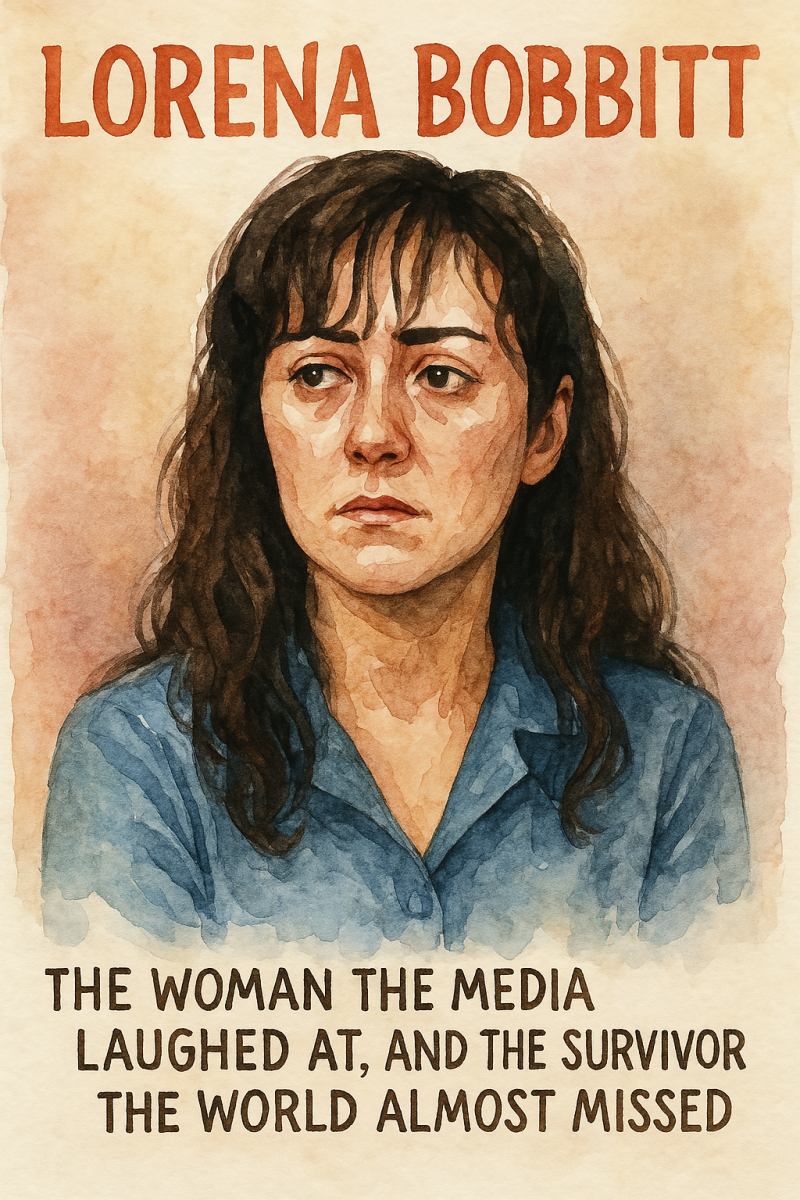
The Night That Shook the Nation
It was June 23, 1993, in Manassas, Virginia, when a young woman named Lorena Bobbitt did something that would send shockwaves through the world.
After years of alleged physical, sexual, and emotional abuse at the hands of her husband, John Wayne Bobbitt, Lorena reached her breaking point. That night, while John slept in their shared bed, Lorena walked into the kitchen, retrieved a knife, returned to the bedroom—and severed his penis.
She then left the apartment, driving off with the severed organ in hand. In a daze, she later threw it into a field, called 911, and told police where to find it. Meanwhile, John was rushed to the hospital, and after a groundbreaking surgery, the penis was reattached.
The act was shocking. The media pounced. And Lorena’s life changed forever.
The Media Circus
The press turned the Bobbitts’ tragedy into a punchline. Late-night talk shows, tabloids, comedians, even sitcoms mocked her. She was painted as a crazy, hysterical woman — the embodiment of every man’s worst nightmare.
The conversation was not about what she endured. It wasn’t about domestic violence. It wasn’t about marital rape, which was still barely acknowledged as a crime in many states.
It was about the penis. The headlines focused on the shock, not the suffering.
Lorena Bobbitt became a cultural joke — and that’s the real tragedy.
Behind Closed Doors: The Abuse
Lorena was born in Ecuador and moved to the U.S. as a teenager. She met John Wayne Bobbitt, a U.S. Marine, and they married young. But what seemed like a fairytale quickly turned into a nightmare.
Lorena testified in court that John had repeatedly raped her, hit her, dragged her by her hair, and humiliated her in private. He controlled her money, insulted her body, and made her feel worthless. She once said:
“I didn’t have a voice. I felt like I was invisible.”
The night of the assault, John had allegedly come home drunk and raped her once again. After he fell asleep, Lorena snapped — not because she was cold or cruel, but because she was done.
Her act wasn’t premeditated revenge — it was trauma erupting.
The Trial(s): His and Hers
There were two major trials: one for John, one for Lorena.
John Wayne Bobbitt was tried for marital sexual assault. He was acquitted.
Lorena Bobbitt was charged with malicious wounding. But her defense attorneys presented a compelling case of long-term abuse and mental instability caused by trauma. A psychologist testified that Lorena was suffering from clinical depression and PTSD.
The jury found her not guilty by reason of temporary insanity. She was sent to a mental health facility for 45 days and then released.

After the Headlines: Healing in Silence
For years after the trial, Lorena disappeared from the public eye. She was mocked, judged, and often hated. John, meanwhile, leaned into his notoriety, starring in adult films, giving interviews, and appearing at strip clubs.
But Lorena chose a different path.
She quietly rebuilt her life. She started a nonprofit, Lorena’s Red Wagon, dedicated to helping victims of domestic violence and abuse. She found love again, had a daughter, and used her story not for fame — but for purpose.
It wasn’t until much later, especially after the #MeToo movement, that the public began to reassess her story with empathy.
A Woman Reclaimed: The Redemption of Lorena
In 2019, Amazon released a docuseries titled “Lorena”, executive produced by Jordan Peele, which gave her space to finally speak — not as a caricature, but as a survivor. The documentary peeled back decades of trauma, pain, and public shame.
What emerged was a woman who never wanted revenge. She wanted safety. She wanted dignity. She wanted to be heard.
“I wanted to stop the pain,” she said in the series. “That was all. That was everything.”
Why Lorena’s Story Still Matters
Lorena Bobbitt’s story is no longer just about a knife and a man’s body part. It’s about the silence that traps women. It’s about how the media fails survivors. It’s about how easy it is to laugh at women in pain.
Her story lives in the echoes of today’s headlines — in every woman who’s told she’s too emotional, too crazy, too dramatic. In every survivor who breaks down and is punished for not breaking quietly.
Lorena was the punchline.
But she was also the warning.
And she still is.
Author’s Reflection
When I read Lorena Bobbitt’s story, I didn’t feel shock. I felt recognition.
I know what it’s like to live with abuse — to be trapped in a world where your voice is silenced, your body is not your own, and your fear becomes routine. I know what it’s like to walk on eggshells while pretending everything’s fine. And I know what it’s like to be expected to show compassion to someone who gave you none.
So when Lorena took that knife and acted, I didn’t recoil. I understood her.
I don’t think what she did was evil. In fact, to me, it honestly doesn’t even feel that bad. Because a man like that — someone who uses and violates another person, who strips them of safety, dignity, and peace — doesn’t deserve kindness. He doesn’t deserve the luxury of being untouched after inflicting so much pain.
There are some wounds that cut so deep they change your relationship with what’s right and wrong. And unless you’ve lived it, you don’t get to judge how someone else survives.
Lorena wasn’t a monster. She was a woman pushed beyond her breaking point, punished for her pain, and turned into a punchline for daring to say “enough.”
She didn’t ask for revenge. She wanted the hurting to stop. And sometimes, when the world refuses to protect you, you end up protecting yourself — however you can.
And for that, I don’t condemn her.
I see her.
I am her.
Add comment
Comments
⸻
i remember watching lorena’s story years ago and thinking wow… she musta been so scared. my ex was the same way. when we moved here from chile i didn’t know nobody, didn’t speak the language, didn’t know where to go. he’d hurt me and then say sorry like it fixed everything. i felt trapped for years. it wasn’t until a lady at a shelter helped me that i finally got out. that was 15 years ago and i still get shaky thinking about it. women like lorena… we don’t always get heard. thank u for sharing her side.